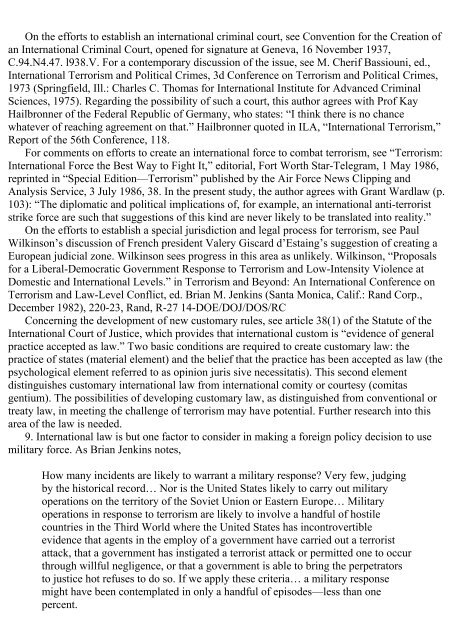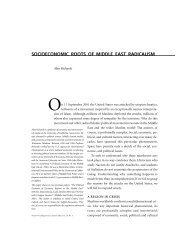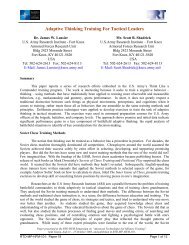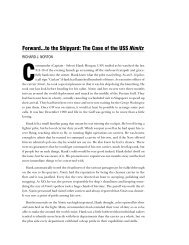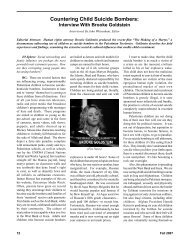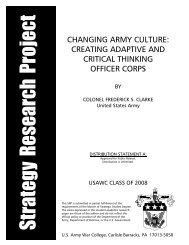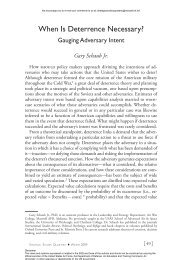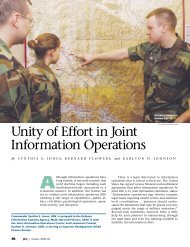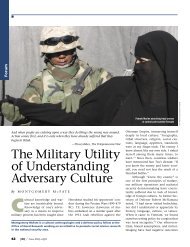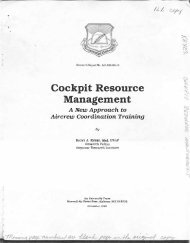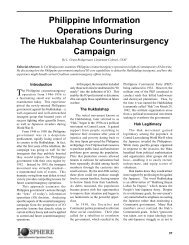Legitimate use of military force against state-sponsored - Air University
Legitimate use of military force against state-sponsored - Air University
Legitimate use of military force against state-sponsored - Air University
You also want an ePaper? Increase the reach of your titles
YUMPU automatically turns print PDFs into web optimized ePapers that Google loves.
On the efforts to establish an international criminal court, see Convention for the Creation <strong>of</strong><br />
an International Criminal Court, opened for signature at Geneva, 16 November 1937,<br />
C.94.N4.47. l938.V. For a contemporary discussion <strong>of</strong> the issue, see M. Cherif Bassiouni, ed.,<br />
International Terrorism and Political Crimes, 3d Conference on Terrorism and Political Crimes,<br />
1973 (Springfield, Ill.: Charles C. Thomas for International Institute for Advanced Criminal<br />
Sciences, 1975). Regarding the possibility <strong>of</strong> such a court, this author agrees with Pr<strong>of</strong> Kay<br />
Hailbronner <strong>of</strong> the Federal Republic <strong>of</strong> Germany, who <strong>state</strong>s: “I think there is no chance<br />
whatever <strong>of</strong> reaching agreement on that.” Hailbronner quoted in ILA, “International Terrorism,”<br />
Report <strong>of</strong> the 56th Conference, 118.<br />
For comments on efforts to create an international <strong>force</strong> to combat terrorism, see “Terrorism:<br />
International Force the Best Way to Fight It,” editorial, Fort Worth Star-Telegram, 1 May 1986,<br />
reprinted in “Special Edition—Terrorism” published by the <strong>Air</strong> Force News Clipping and<br />
Analysis Service, 3 July 1986, 38. In the present study, the author agrees with Grant Wardlaw (p.<br />
103): “The diplomatic and political implications <strong>of</strong>, for example, an international anti-terrorist<br />
strike <strong>force</strong> are such that suggestions <strong>of</strong> this kind are never likely to be translated into reality.”<br />
On the efforts to establish a special jurisdiction and legal process for terrorism, see Paul<br />
Wilkinson’s discussion <strong>of</strong> French president Valery Giscard d’Estaing’s suggestion <strong>of</strong> creating a<br />
European judicial zone. Wilkinson sees progress in this area as unlikely. Wilkinson, “Proposals<br />
for a Liberal-Democratic Government Response to Terrorism and Low-Intensity Violence at<br />
Domestic and International Levels.” in Terrorism and Beyond: An International Conference on<br />
Terrorism and Law-Level Conflict, ed. Brian M. Jenkins (Santa Monica, Calif.: Rand Corp.,<br />
December 1982), 220-23, Rand, R-27 14-DOE/DOJ/DOS/RC<br />
Concerning the development <strong>of</strong> new customary rules, see article 38(1) <strong>of</strong> the Statute <strong>of</strong> the<br />
International Court <strong>of</strong> Justice, which provides that international custom is “evidence <strong>of</strong> general<br />
practice accepted as law.” Two basic conditions are required to create customary law: the<br />
practice <strong>of</strong> <strong>state</strong>s (material element) and the belief that the practice has been accepted as law (the<br />
psychological element referred to as opinion juris sive necessitatis). This second element<br />
distinguishes customary international law from international comity or courtesy (comitas<br />
gentium). The possibilities <strong>of</strong> developing customary law, as distinguished from conventional or<br />
treaty law, in meeting the challenge <strong>of</strong> terrorism may have potential. Further research into this<br />
area <strong>of</strong> the law is needed.<br />
9. International law is but one factor to consider in making a foreign policy decision to <strong>use</strong><br />
<strong>military</strong> <strong>force</strong>. As Brian Jenkins notes,<br />
How many incidents are likely to warrant a <strong>military</strong> response? Very few, judging<br />
by the historical record… Nor is the United States likely to carry out <strong>military</strong><br />
operations on the territory <strong>of</strong> the Soviet Union or Eastern Europe… Military<br />
operations in response to terrorism are likely to involve a handful <strong>of</strong> hostile<br />
countries in the Third World where the United States has incontrovertible<br />
evidence that agents in the employ <strong>of</strong> a government have carried out a terrorist<br />
attack, that a government has instigated a terrorist attack or permitted one to occur<br />
through willful negligence, or that a government is able to bring the perpetrators<br />
to justice hot ref<strong>use</strong>s to do so. If we apply these criteria… a <strong>military</strong> response<br />
might have been contemplated in only a handful <strong>of</strong> episodes—less than one<br />
percent.


